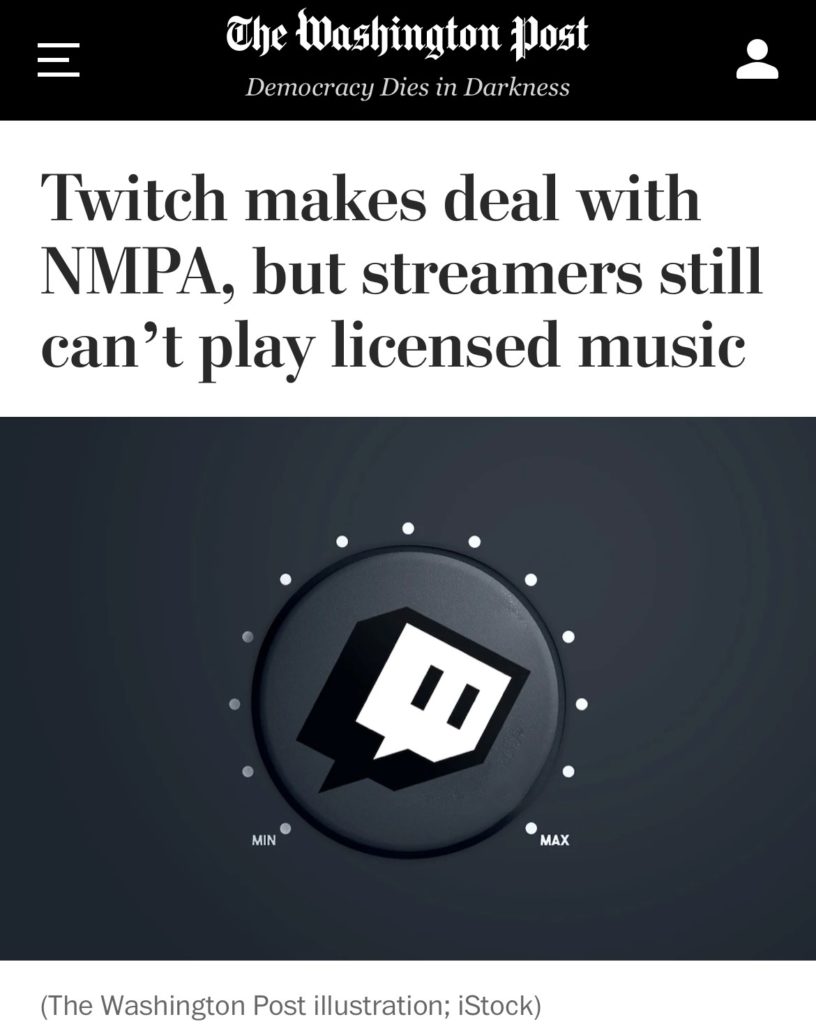Media
Twitch makes deal with NMPA, but streamers still can’t play licensed music | The Washington Post

Today Twitch sent an email to streamers detailing the terms of the deal, which has been rumored for a while — most recently in a report by Billboard published last week.
“As part of this agreement, we want to let you know about a new process that we are creating that participating music rights holders can opt into to report certain uses of their music, which is more flexible and forgiving to creators who inadvertently or incidentally use music in their streams than the existing process required under the DMCA and similar global laws,” Twitch wrote in its email. “This new process does not change how music can be used on Twitch. As we’ve said consistently, it’s never okay to include music in your channel unless you’ve secured the necessary rights or have the authority to do so.”
Previously, if streamers received multiple DMCA notices, they were at risk of having their Twitch channels suspended or permanently banned. Twitch had to do this because of how the DMCA works: On one hand, it shields companies from legal liability when users infringe upon copyrights, but that protection dissolves if companies don’t immediately remove offending content and take a series of escalating actions against repeat offenders. On Twitch, this led to an environment in which streamers felt perpetually endangered not just by music they opted to play, but even music and sound effects in games. Some developers, in turn, began to include streamer-friendly modes in their games — sometimes to disastrously awkward effect.
Twitch’s new process focuses on “going-forward flagrant uses of music” and warns streamers instead of penalizing them right off the bat. As with Twitch’s DMCA response protocol, a Twitch team will review reports from rights holders and remove offending VODs and clips. Generally, the team will then issue a warning to the streamer in question and move on. If streamers go beyond simply playing music in the backgrounds of their broadcasts — a long-running Twitch trend that caught the music industry’s ear in the first place — Twitch might opt to penalize them “depending on the creator’s history of that kind of music use."
This language gives Twitch a fair amount of wiggle room. While Twitch has offered some examples of “flagrant” music usage like broadcasting concerts and prerelease tracks, it remains to be seen how it will weigh, for example, a streamer intentionally playing music from Spotify or a YouTube playlist versus someone accidentally encountering licensed music while live-streaming in public.
The deal comes after a tumultuous summer during which NMPA president and CEO, David Israelite, took specific aim at Twitch. As part of a June speech at the NMPA’s 2021 annual meeting, Israelite said an "intensive enforcement program to ID and remove unlicensed songs from [Twitch]” was already underway at the time. Today Israelite acknowledged that enforcement program and told The Post that this deal “settles for the past and provides the environment for those conversations about the long-term future to be productive.” He also noted that the deal “does pave the way for Twitch to license music if it decides it wants to provide that benefit to its streamers.”
With other platforms like Facebook having secured music licensing deals for partnered streamers, Twitch streamers are largely disappointed by the deal.
“This protects Twitch, not you,” said a partnered Twitch streamer who goes by the handle Tugboet. “Nothing changes for you.”
“Nothing has changed yet,” said Harris Heller, creator of a copyright-free music collection for streamers called StreamBeats. “No rights have been secured, you still can’t listen to music without a license. Make sure you protect yourself and only listen to safe music.”
In a news release, the NMPA suggested this deal does more than just what Twitch’s email outlined — albeit mostly for music publishers and musicians, not streamers.
“The deal paves the way for the economics of new gaming models to increase visibility and revenue for songwriters,” the NMPA wrote. “From virtual shows to studio sessions, the partnerships stemming from this agreement will connect the Twitch community in many ways to the music they enjoy.”
Regardless of which creators benefit most from the deal, it does seem to take heat off Twitch, which as recently as May of this year continued to field thousands of DMCA notices from music industry rights holders. Last year, Mitch Glazier, CEO of the Recording Industry Association of America, explained why music industry organizations put pressure on Twitch by bombarding its increasingly unsatisfied streamers.
“Twitch continues to turn a blind eye to the same users repeatedly violating the law while pocketing the proceeds of massive unlicensed uses of recorded music," Glazier told Variety. "And Twitch’s claim that it responds to takedown requests it considers ‘valid’ fails to show good faith with music creators. Further, Twitch’s shifting of its responsibilities to artists who use the platform is certainly not the act of a company that genuinely wants to partner with creators.”
For the moment, it appears that Twitch has found a way to make peace — or at least de-escalate tensions — with the music industry.
“We recognize that not all unauthorized uses of music merit the same treatment,” Twitch wrote in its email to streamers, “and it is our hope that we can, as part of our agreements with music rights holders, take a balanced approach that supports creators on Twitch.”
Read on The Washington Post.
